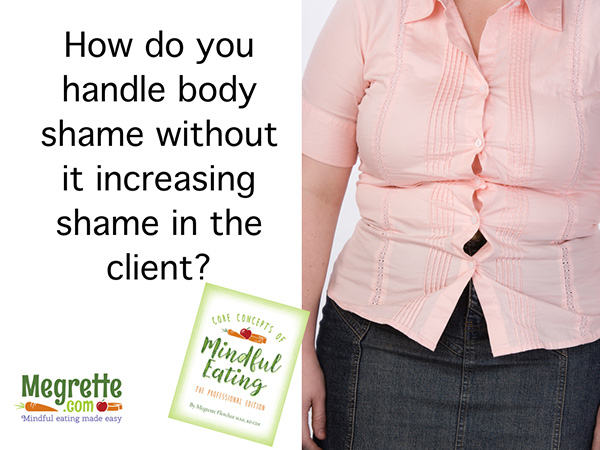The present moment is a busy place. The Core Concepts of Mindful Eating describes the present moment as having three distinct aspects – Sensory experience, Thought experience, and Emotional experience.
Step 1
- Stretch your ability to engage in nonjudgmental observation of the current situation. The current situation includes three areas of focus:
- Sensory experience: Taste, sight, sound, feel, hunger, fullness, satiety, wellness, illness, pain, discomfort, etc.
- Thought experience
- Emotional experience
Many dietitians are comfortable talking with their clients about sensory experiences, which include the states of being, sights, sounds; the feelings of hunger, fullness, satiety; and the feelings of wellness, illness, pain, and physical discomfort. However, exploring the thoughts and emotional experiences which are also part of the present moment may be less familiar. How a person thinks or feels about the present moment can have a large effect on food, eating, and their overall health behaviors. In a 2017 study, the University of Pennsylvania identified a significant relationship between the internalization of weight bias and having a diagnosis of metabolic syndrome, which is a marker of poor health.[1]
This case study explores the common situation of a client experiencing body shame, and how mindful eating can assist the counselor in identifying the body shame without increasing it in the client.
Meet Linda, who just explained at a nutrition appointment, “I look in the mirror, and I just don’t know that person anymore. I am ashamed of my body because none of the clothes I try on fit. I don’t think my body is beautiful anymore.”
In the book The Core Concepts of Mindful Eating, unpacking a clients’ thought and feeling experiences is a complex process. In this dialogue, the counselor is going unpack Linda’s feelings by using the mindfulness technique of being aware of her feelings and feeling them in the body.
Counselor: Linda, thank you, for letting me know what you have been experiencing. I hear you saying you are ashamed of and upset by the changes in your body shape.
Linda: I am struggling, and part of me just wants to eat a pint of ice cream and pretend that it will all go away tomorrow.
Counselor: You are feeling the pull to comfort this pain with food.
Linda: Yes, I know it works, at least for a little while.
Counselor (summarizes the situation for the client): Linda, you recently tried on clothes, and the experience was upsetting because you looked in the dressing room mirror and you didn’t recognize yourself anymore.
Linda: (She nods her head affirmatively)
Counselor: Can you tell me where in your body you are feeling this experience?
Linda: (touches her chest)
Counselor: Are you feeling this anywhere else in your body?
Linda: I almost want to remove my body from the waist down and discard it.
Counselor: You want to disconnect from your body.
Linda: Yes! I am so ashamed of my body.
Counselor: That shame is preventing you from hearing your body and learning what your body needs.
Linda: I am mad at my body!
Counselor: This anger is stopping you from having a healthy relationship with your body.
Linda: Yes! It is so tiring, and I know it isn’t helping the situation.
Counselor: You want to have a better relationship with your body. You want to hear what your body needs and learn to care for it.
Linda: Yes! And I am stuck because I just don’t know how!
In this brief dialog, the counselor uses an activity called Where Your Emotions are Felt, on page 89 of The Core Concepts of Mindful Eating. This activity helped the counselor learn where Linda was experiencing her feelings in her body. As the client connected with sensing her feelings, she also identified that she wanted to disconnect with specific parts of her body. In this dialog, the counselor surmised the feelings were hard to live with and were the barrier to having a healthier relationship with her body. The counselor was using the Motivational Interviewing technique of reflection. Some of her reflections were simple to help Linda know she was being heard, and other reflections were more complex, helping Linda realize the larger issue was understood. Looking at the dialogue, the reflections were offered as statements, not questions which kept the conversation flowing.
This emotionally charged conversation could go in many directions. What the counselor demonstrated well was the nonjudgmental observation of what the client was experiencing. This is Step 1 in the Mindful Eating Map. Also, the counselor’s counseling style was full of collaboration, acceptance, and compassion. Tom Wadden, PhD, co-author of the study and a professor of Psychology in Psychiatry and director of Penn’s Center for Weight and Eating Disorders explains, ”Providers can play a critical role in decreasing this internalization by treating patients with respect, discussing weight with sensitivity and without judgment, and giving support and encouragement to patients who struggle with weight management – behaviors everyone should display when interacting with people with obesity.”[2]
Mindful Eating Counseling provides the foundation of non-judgmental awareness which will help Linda move away from negative shaming thoughts and emotions. You can learn more about Mindful Eating by purchasing The Core Concepts of Mindful Eating: Professional Edition or signing up for the Oh, That Will Work! Newsletter. If you are looking for further resources, consider these handouts and webinars.
Evaluating Effort Activity Handout
This handout can help your clients understand resistance by considering the effort it takes to change. Described on page 128, this simple tool can help your clients consider, is this level of effort maintainable?
The Mindful Eating Map Handout
This handout visualizes the five steps of mindful eating which is described on page 63. It provides an excellent guide for professionals new to Mindful Eating and a discussion tool for group programs. Learn more about The Core Concepts and receive some free handouts, visit www.megrette.com. The complete set of handouts, activities, and meditations that are use in my book are provided with the purchase of the Core Concepts of Mindful Eating: Professional Edition.
[1] “Fat Shaming Linked to Greater Health Risks – PR News.” – PR News. Penn Medicine.org, 27 Jan. 2017. Web. 29 May 2017.
[2] “Fat Shaming Linked to Greater Health Risks – PR News.” – PR News. Penn Medicine.org, 27 Jan. 2017. Web. 29 May 2017.


